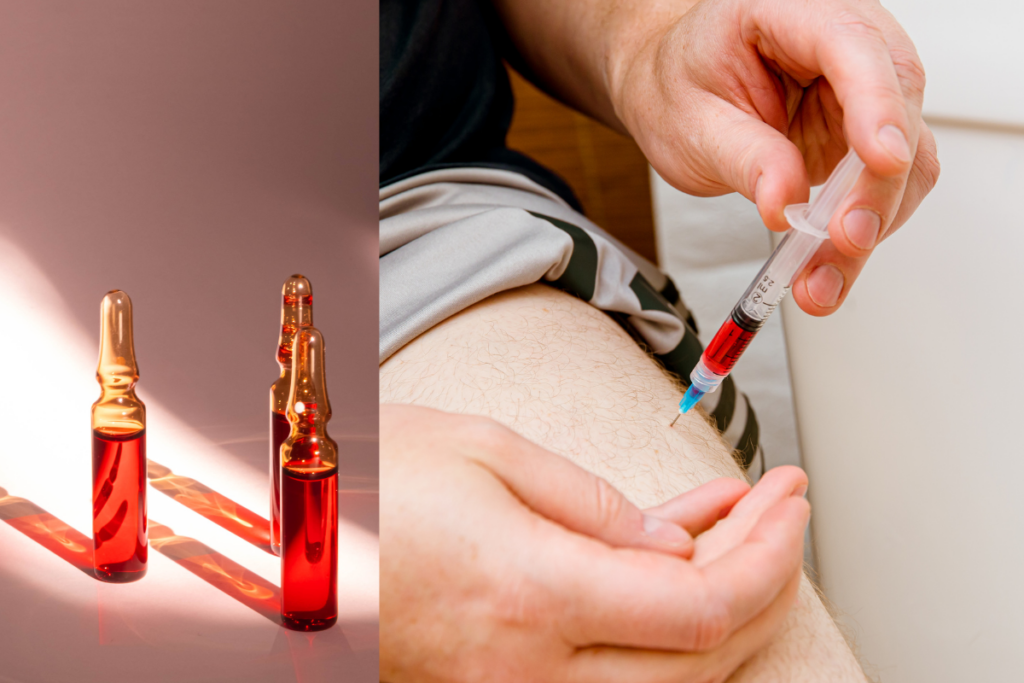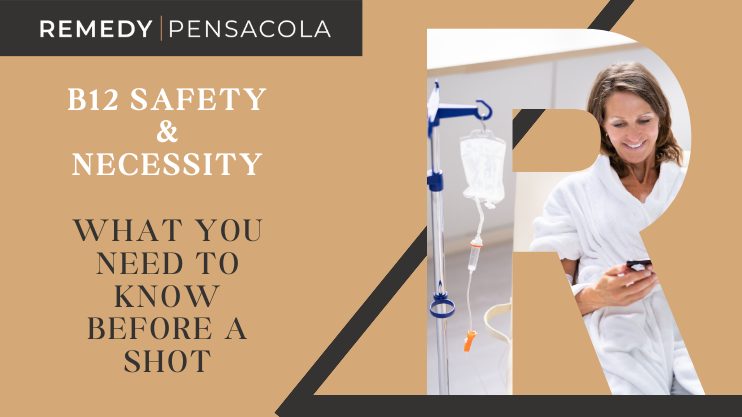Lately, we have been hearing so much talk about B12 shots and injections. They are becoming super trendy. But a big question is, are B12 injections actually safe? What if it is administered to someone who should not be getting them? Let us investigate the safety factors and discuss who might benefit from B12 injections.
First, what exactly is a B12 shot? Vitamin B12 injections are when liquid B12 is injected into your body through a needle either under the skin or into a muscle. It allows your body to absorb the B12 without going through your digestive system first.
Some doctors prescribe B12 shots for people with low B12 levels or conditions that make it hard to absorb B12 from foods and supplements. The shots help raise B12 levels quickly.
What are B12 injections?
The Baltimore Hospital is acknowledged as the first to develop vitamin cocktails that can be injected or administered intravenously. The doctor there, Dr. John Myers, was concerned that just a tiny portion of the vitamins taken by supplementation or diet was actually absorbed into the bloodstream, so a different method was created.
Vitamin B12 shots require a prescription from a physician. However, some believe that the demand for the shots is increasing, as is the demand for health and wellness clinics and even naturopaths to give these shots to patients and walk-ins without a prior prescription.
If you receive a vitamin B12 shot, the ingredient will most likely contain an injection of cyanocobalamin, also known as hydroxocobalamin or the natural form methyl-cobalamin. The injection is made into the muscle or beneath the skin.
It can also be administered into the vein, but the majority is likely to be absorbed through urine. Although the vein could be the most efficient method of achieving results, injecting vitamin B12 into the muscle could let it stay longer in your system.
You can administer the injections yourself. However, that does not mean you should not, at the very least, not with the permission or direction of a physician or other health professional.
Should I Get A B12 Shot?
Okay, we have covered the basics of B12 injections. Now, who needs to get B12 shots from their doctor? Here are some of the main reasons your doctor might recommend getting B12 injections:
If You are B12 Deficient
It is the number one reason to get B12 injections, to correct a vitamin B12 deficiency. Symptoms of B12 deficiency include exhaustion no matter how much you sleep, muscle weakness and frequent cramping, constipation, loss of appetite and unexplained weight loss, numbness or tingling in the hands and feet, depression, and problems with memory and focus.
You Have Absorption Issues
Some people have trouble properly absorbing vitamin B12 from foods and oral supplements due to digestive disorders like celiac disease or Crohn’s disease. B12 shots altogether bypass any absorption issues in the gut.
You Have Pernicious or B12 Anemia
These types of anemia happen when the body cannot make enough healthy red blood cells. B12 is essential for red blood cell production, so B12 injections can help improve anemia related to B12 deficiency.
You are a Vegetarian or Vegan
Since the primary dietary sources of B12 come from animal products, strict vegetarians and vegans are at very high risk of developing a B12 deficiency. In that case, a doctor will likely recommend B12 shots to get their levels up to where they should be.
You are Over Age 50
As we age, our bodies steadily absorb less B12 from the foods we eat. So doctors often prescribe B12 injections for patients over 50 to help keep their B12 levels healthy.
You Want an Energy Boost
Some people report feeling a boost in their energy levels after getting B12 shots. However, that will only happen if fatigue is caused by being B12 deficient before the shots are started. B12 does not provide any extra energy if you are not deficient.

Are B12 Injections Safe?
When used appropriately under medical supervision, B12 injections are generally considered very safe. The most common side effect is temporary mild irritation at the injection site. However, B12 shots can interact with some medications and are not recommended for people with certain conditions like kidney disorders. It is essential to discuss your health history with your doctor before starting B12 injections to ensure they are appropriate for you.
Now, let us talk about potential risks and side effects.
Pain and Irritation at Injection Site
The most common reaction to B12 injections is pain, redness, swelling, or irritation, where the needle goes into your skin or muscle. This is usually mild and goes away within a day or so. However, call your doctor if the soreness worsens or lasts more than 2-3 days.
Allergic Reactions
In rare cases, some people may have a severe allergic reaction to ingredients in the B12 shot. Signs of a severe allergic reaction include trouble breathing, hives breaking out on the skin, swelling of the face and throat area, a fast heartbeat, or feeling like you might pass out. If this happens, call 911 or get emergency help immediately.
Interactions with Medications
Before getting B12 injections, tell your doctor about ALL medications you take – prescription, over-the-counter, supplements, etc. Large amounts of B12 can potentially interact with some drugs used for diabetes, heartburn, seizures, and more. Your doctor needs the whole picture.
Exceptional Cases to Avoid Shots
People with kidney problems, iron deficiencies, or known sensitivities/allergies to vitamin B12 should not get B12 injections since side effects could be more likely. B12 shots are also not recommended if you have a history of issues like leukemia, myeloma, or certain types of anemia not caused by B12 deficiency.
Mild Nausea or Diarrhea
Some people report feeling nauseous or having mild diarrhea after getting B12 injections. It typically resolves on its own within a day or so. However, if it persists, be sure to let your doctor know.
The takeaway is that B12 injections are usually considered very safe, and side effects are uncommon when used appropriately. However, it is so important to talk to your doctor first, especially if you have any underlying medical conditions or take medications.
Conclusion
The bottom line is that you should always check with your doctor before getting B12 injections. They can review your symptoms, medical history, and medications and determine whether shots suit your situation. Blood work can confirm whether you have a B12 deficiency or not. Dietary adjustments may be an alternative if you are not severely deficient.



